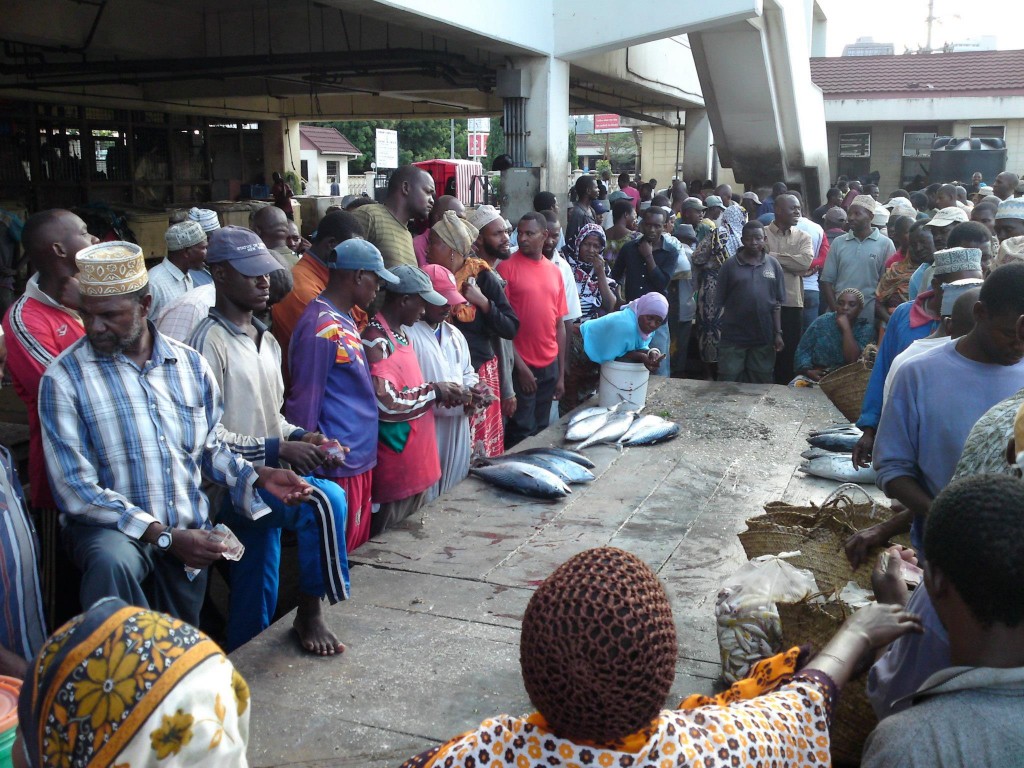“Women and children first” went the call from the deck of the titanic. And then of course Jack sacrificed his own life to save Rose, who was afloat on what admittedly looked like a raft with more than enough space for two. Chivalrous though this picture is, the reality is very different – in most disasters women seem to suffer a disproportionate number of injuries and deaths.
Most countries now have gender policy incorporated into health, education and employment. It is only recently however, that gender has been considered in disaster and risk reduction programmes. Researchers have started to record the gender of people who die or report injuries. The findings show large differences in the way the two genders are affected by different disasters. This is hardly surprising – gender determines your economic role, level of education and lifestyle in most societies, particularly in developing countries.

A male dominated environment at the fish market in Tanzania. Gender determines where people are likely to be and what they will be doing in a disaster. Credit: Patrick Bradley
Girls are less likely to be taught to swim, so are more likely to die in floods (and on sinking ships), and are more likely to be illiterate, so may be unable to read evacuation instructions and emergency advice. In the L’Aquila earthquake lots of women lost their lives in collapsed buildings as they were more inclined to behave ‘passively’ and return to their homes after the foreshock warning signs.
In some societies, men and boys are given priority for food when resources are scarce in the immediate aftermath of a disaster. Groups tend to gather in large temporary shelters following a major disaster, and often women don’t feel safe, and indeed are not safe, in these places. Women in displaced people camps are particularly vulnerable to sexual violence.
Returning to normality after a disaster is a slow process. In Haiti, women tend to do lower paid work such as domestic service, and are also responsible for all household tasks and caring roles within the family. Women are finding it harder than men to rebuild their businesses after the 2010 earthquake. After the L’Aquila earthquake, Italy, women also suffered from higher levels of unemployment and post-traumatic stress in the years that followed. The coping mechanisms of men affected by the disaster led to an increase in substance abuse and domestic violence, problems that further affected women.
Data collected so far indicates that women and girls suffer disproportionately during, immediately after, and long-term from the effects of a disaster, but research into the gender bias in disaster response is currently very limited. Every disaster occurs in different circumstances, and these will change regularly. There will be some circumstances where men are disproportionately affected, for example in a tsunami men may be more likely to be working on fishing boats and in ports.
The real question is, why do we care about the gender of people who die in disasters? After all, if a man survives but loses his wife and children, there are no winners. It is important that we understand as much as possible about the circumstances that affect peoples vulnerability to a hazard. In most societies gender is an important factor in determining the circumstances somebody will be in when a hazard occurs. The more we know, the more we can do to reduce risk in future disasters across all genders and age groups. Research into this area must continue, and be communicated in a way that politicians can understand and incorporate into policy.
Recommended reading
One of the first academic papers to recognise the excessive mortality rates among girls and women in disasters: Rivers, 1982
Ellie Murtagh, GfGD secretary, helped research a fantastic article about the role of women in disasters during her summer 2012 GfGD/CAFOD placement.
With thanks to the UCL Institute for Risk and Disaster Reduction, who held a panel discussion on gender in disasters on the 8th of March, where many of these issues were debated by a panel of experts.
